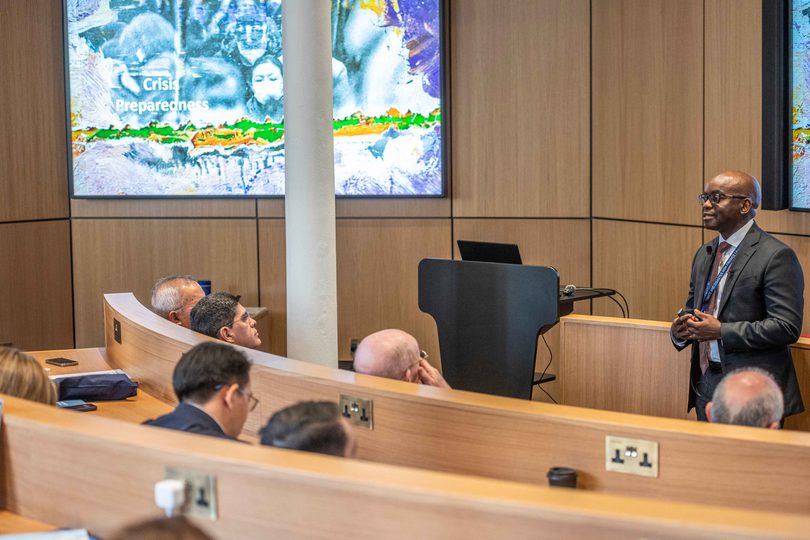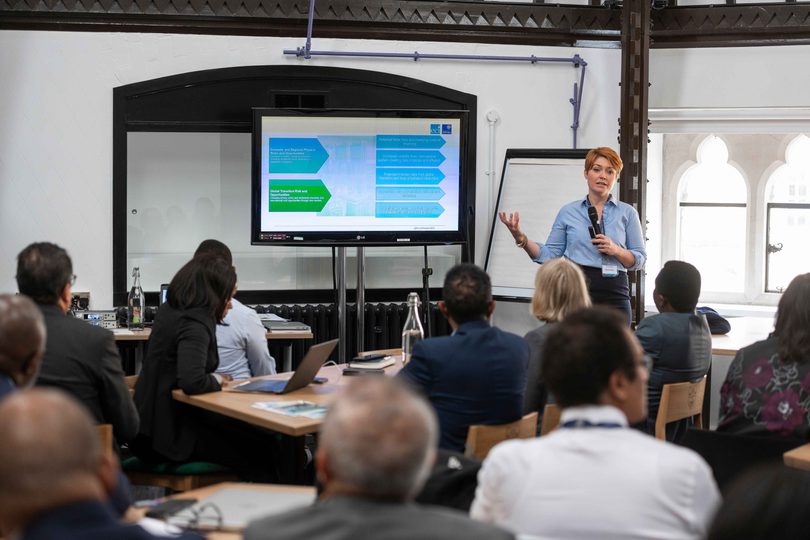
The Oxford Martin Systemic Resilience Initiative recently demonstrated its expertise in advancing practical solutions to manage global shocks – particularly those related to climate and nature risks in emerging market and developing economies (EMDEs) – by holding a series of thought leadership discussions and executive teaching workshops attended by World Bank leaders and over 30 senior officials from Ministries of Finance and financial regulators from more than 20 countries.
A key highlight of the programme’s schedule was a roundtable discussion with the Bank’s Vice President for Equitable Growth, Finance and Institutions Pablo Saavedra alongside a range of academics working on Oxford Martin School research programmes that explored climate resilient development, nature and financial resilience in EMDEs.
It highlighted issues such as the impacts of climate change on an EMDE’s credit ratings and how to mitigate these, the role of international financial institutions (IFIs) in helping to mobilise sustainable investment, and how we can integrate resilience and nature more firmly into the evolving global financial architecture. Roundtable participants also discussed the role of the World Bank in preparing countries for such long-term future risks, including by focusing on adaptation-based financing alongside mitigation and working more effectively with the insurance industry.

Delegates at the workshop are addressed by Dr Nicola Ranger
'International financial institutions will need to play an increasingly important role in ensuring global systemic resilience in a world of growing climate and nature risks. The World Bank is one of the few institutions globally with the mandate, financial & convening firepower, and knowledge that are urgently needed,' said Dr Nicola Ranger, Executive Director of the Oxford Martin Systemic Resilience Initiative.
'We are delighted to collaborate with the Bank to explore ways to deploy these strengths to help emerging and developing economies to achieve resilient and sustainable development, and feel deeply honoured and privileged to have the opportunity to share and learn together with more than forty senior officials from all over the world at the University of Oxford.'
Another key visitor from the World Bank was Dr Samuel Munzele Maimbo, vice president for budget, performance review and strategic planning. He delivered a keynote speech at the School organised with the Systemic Resilience programme on the challenges of the World Bank in navigating an unprecedented level of political, economic and social unrest alongside an increasing divergence of views on the causes and appropriate responses.
At a subsequent roundtable with Oxford Martin School academics, Dr Maimbo explored the current state of art regarding systemic resilience and climate policy within Oxford, and how a global multilateral development bank like the World Bank could play a more effective role in the world today.
Discussions focused on how to move towards more efficient coordination and allocation of global development finance to ensure effective investment in net-zero initiatives; how to address debt crisis and ensure resources for energy transitions in EMDEs; how to incorporate natural capital in policy planning in EMDEs; and the need to consider food security and agriculture needs holistically.
The week concluded with a two-day executive education programme on the climate and disaster risk finance delivered by the World Bank in partnership with the Systemic Resilience programme, Global Shield against Climate Risks and Insurance Development Forum (IDF). More than 30 senior finance leaders from Ministries of Finance and Financial Regulators from over 20 countries joined together to learn a comprehensive framework for contextualising disaster risk finance and mobilising resilience finance within their own countries’ settings and to share their experience in implementing climate risk finance solutions and instruments.